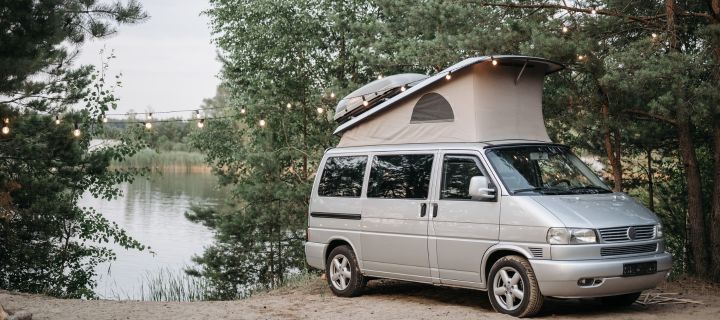
Do you have your heart set on a motorhome retirement? Are you planning a camper van tour in the UK or abroad? We have compared camper van and motorhome lifestyles, along with what you need to factor in from a financial perspective. Whether you’ve had the opportunity to retire early or you’re planning ahead, it’s worth knowing all the pros and cons.
Camper van to rent or buy
Let’s start with camper vans. The beauty of these vehicles is the fact they are more compact than motorhomes, making them easier to drive. Depending on the make and model, these vehicles are also easier to park and often fit within a standard car parking space. However, you will need to know your vehicle height, as some car parks have height restrictions.
If you are thinking of spending part of your retirement in a camper van, then you’ll need to be happy with less space. These vehicles are usually a lot smaller than motorhomes. As you can only store a limited number of supplies, you could be shopping or eating out more regularly. So, you’ll need to plan your trip in advance for more rural escapes carefully.
Nowadays, there’s a wide choice in camper vans, and the average cost for a new vehicle is between £20,000 to £100,000. The price will depend on the vehicle manufacturer, model, age, condition, mileage, features and amenities. Basic camper vans usually have a sink, water tank and a cooker/hob (Campingaz gas bottle). As a comparison, high-end, luxurious vehicles can often have hot water, an off-grid electric cooker/hob and a fridge-freezer.
New camper vans cost considerably more than older ones; basic second-hand vehicles can be bought for as little as £1,000. Some previously owned camper vans have undergone significant renovations with conversions including showers and toilet cubicles. Generally, unless you have a luxury camper van, you may be more dependent on campsite facilities such as showers. So, you’ll need to factor campsite costs into your financial plan too.
Motorhome retirement
Motorhomes are a more spacious way to both holiday and live. They are often kitted out with home-from-home facilities for a more comfortable lifestyle. As they are much larger than camper vans, you will need to practice driving this type of vehicle. The width can be an issue for smaller roads. If you’re a couple, you will need to decide whether you can both drive the motorhome. Otherwise, one person may end up doing all the driving, which can be tiresome.
Depending on the type of motorhome, costs range from £50,000 to £150,000 and depend on the vehicle class, size, number of berths, amenities and features. There are usually good kitchen facilities with a cooker/hob, sink, and workspace. The on-board toilet and shower is useful if you are looking for more of a wild camping, off-grid lifestyle. Sleeping arrangements vary and are usually either above the driving area or via a convertible sofa.
Second-hand motorhomes are cheaper and can be found for as little as £5,000 for a small vehicle. However, you would need to carefully check the vehicle’s condition and factor in extra costs for potential repairs.
What you need to know
Many camper van and motorhome rental companies will not lease a vehicle to someone aged over 75 years. So, if you are already approaching state retirement age, don’t put off this type of adventure for too long. As you get older, motor insurance can increase in price too, especially if you have any health conditions, so it’s worth factoring in this cost.
It’s recommended to rent and try camper vans and motorhomes before you buy, which will allow you to experience life on the road. If you plan to spend a considerable amount of time away in this type of vehicle, then it’s worth having a good level of mechanical knowledge. Whether you’re in the UK or further afield, if you break down in a remote spot with poor mobile connectivity, some basic mechanical knowledge will be helpful.
If you’re thinking of buying a second-hand camper van or motorhome, then make sure the
vehicle is structurally sound. Look out for rust on the bodywork and whether the floor inside is delaminated, for example, if it feels spongy underfoot. Also, look for damp spots inside the vehicle, including cupboard interiors and underneath seats and mattresses. If you’re planning a long trip, ask a local garage to check the engine, tyres and brakes.
Holistic financial planning, Nottingham and Derby
At Balance: Wealth Planning, we have a holistic approach to financial planning. Before working out your financial position, we always factor in your aims and aspirations. There might be different strategies to fund your camper van or motorhome retirement.
Depending on whether you have reached the required age, you might be able to draw funds from your private or personal pension. If you plan to keep your main home, you’ll need to calculate your income to ensure you can cover your lifestyle, repairs, and household bills. Our team will use cash-flow planning software, so you can see your current and future financial position. It’s also worth getting a pension review to get an up-to-date forecast.
In many cases, a reorganisation of your savings and investments strategy could enable your money to work harder for you. Our team would be happy to carry out a review and create a sensible financial plan to help you achieve your motorhome retirement dreams.
A financial plan can help you achieve your retirement dreams. Get in touch to speak to our financial planning team.
Sources:
https://www.caravanclub.co.uk/
https://www.motorhomematt.co.uk/episodes/living-in-a-motorhome-in-retirement/
https://eternitycampers.co.uk/how-much-is-a-camper-van-in-the-uk/
https://omcmotorhomes.co.uk/how-much-do-motorhomes-cost/

